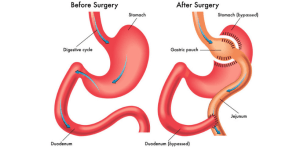Lap Band vs. Gastric Bypass: What Is the Difference?
Weight loss surgeries, such as lap band surgery and gastric sleeve operations, have distinct qualifications and outcomes that patients should be aware of. In terms of gastric sleeve qualifications, individuals generally need to have a body mass index (BMI) of 40 or above, or a BMI of 35-39.9 with obesity-related health issues. On the other hand, lap band surgery may be an option for patients with a lower BMI, typically between 30 and 40.
When it comes to the procedure itself, a gastric sleeve involves permanently removing a portion of the stomach to create a smaller sleeve-shaped stomach. This reduces the stomach’s capacity, leading to a feeling of fullness with smaller meals. A lap band surgery involves placing an adjustable band around the upper part of the stomach. Hence, it creates a small pouch. This restricts the amount of food the stomach can hold and slows down the digestion process.
Potential patients should consult their healthcare provider to determine the most suitable weight loss surgery option for their needs. Understanding the qualifications and differences between gastric bypass and lap band is crucial. It’s the only way of making an informed decision and securing insurance coverage, if applicable.
Gastric Bypass Surgery
Gastric bypass surgery, or “stomach stapling” is a weight loss procedure. The procedure involves making the stomach smaller and rerouting the digestive system. We usually recommend it for individuals who are severely obese.
During the surgery, the stomach is divided into a smaller upper pouch and a larger lower pouch. The small intestine is then rearranged to connect to both pouches, bypassing a portion of the stomach and the first part of the small intestine. This reduces the amount of food that can be consumed and limits the absorption of calories and nutrients.
Lap (Gastric) Band Surgery
Lap band surgery involves placing a silicone band around the upper part of the stomach. The band creates a small pouch, which limits the amount of food that patients can consumed. Thus, it promotes feelings of fullness with smaller portions.
Unlike gastric bypass surgery, lap band surgery is a less invasive and reversible procedure. The band can be adjusted or removed as needed, offering flexibility for individual needs and preferences. It’s important to note that while lap band surgery can help with weight loss, long-term success depends on making sustainable lifestyle changes, including adopting a healthy diet and regular exercise routine.
Gastric Bypass Surgery: Pros and Cons
Pros:
Significant Weight Loss
Moreover, gastric bypass surgery can lead to substantial and sustained weight loss, with many individuals losing a significant amount of excess weight within the first year.
Improvement in Obesity-Related Health Conditions
The procedure can help improve or resolve obesity-related health issues such as type 2 diabetes, high blood pressure, sleep apnea, and joint pain.
Long-Term Results
Gastric bypass surgery has shown to provide long-term weight loss and health benefits for many patients.
Potential for Improved Quality of Life
Losing excess weight can enhance mobility, self-esteem, and overall quality of life.
Restructuring of Digestive System
By rerouting the digestive system, gastric bypass surgery alters the production of certain hormones that regulate hunger and satiety, helping patients feel satisfied with smaller portions of food.
Cons:
Surgical Risks
As with any surgical procedure, gastric bypass surgery carries risks such as infection, bleeding, blood clots, and adverse reactions to anesthesia.
Nutritional Deficiencies
The procedure can lead to deficiencies in essential nutrients such as vitamins and minerals. Lifelong supplementation and regular monitoring of nutrient levels are necessary.
Potential Complications
Some patients may experience complications such as dumping syndrome (rapid emptying of stomach contents), gallstones, hernias, ulcers, or strictures.
Lifestyle Changes
Gastric bypass surgery requires lifelong commitment to dietary changes, portion control, and regular exercise to maintain weight loss and prevent complications.
Psychological and Emotional Considerations
Furthermore, patients may experience psychological and emotional challenges related to adjusting to the physical and lifestyle changes associated with the surgery.
Lap Band Surgery Pros and Cons
Pros:
Adjustable and Reversible
Lap band surgery is adjustable, allowing for the tightening or loosening of the band as needed to achieve optimal weight loss. Additionally, the band can be removed if necessary.
Less Invasive Procedure
Lap band surgery is generally considered less invasive compared to other weight loss surgeries, resulting in potentially shorter hospital stays and faster recovery times.
Lower Risk of Nutrient Deficiencies
Lap band surgery does not typically result in malabsorption of nutrients. Thus, it reduces the risk of nutritional deficiencies.
Gradual Weight Loss
The weight loss achieved with lap band surgery is often gradual. Thereupon, it allows for better adjustment to new eating habits and lifestyle changes.
Less Chance of “Dumping Syndrome”
Dumping syndrome, a common side effect of gastric bypass surgery, is less likely to occur with lap band surgery.
Cons:
Slower and Less Significant Weight Loss
Compared to procedures like gastric bypass or gastric sleeve, lap band surgery generally leads to slower and potentially less overall weight loss.
Band-Related Complications
The lap band itself can cause complications such as band slippage, erosion, or infection, which may require additional surgical procedures to address.
Frequent Follow-Up Visits
Patients who undergo lap band surgery, on the other hand, require regular follow-up visits to adjust the band, monitor progress, and address any potential issues.
Possibility of Band-Related Restrictions
Some patients may experience difficulties with eating certain types of food, and the band may need to be adjusted or removed if complications arise.
Potential for Long-Term Maintenance
Additionally, successful weight loss and maintenance with lap band surgery require long-term commitment to lifestyle changes, including dietary modifications and regular exercise.
Lap Band vs Gastric Bypass: Which Option Is Best For You?
Are you wondering which weight loss procedure is the best option for you? Book a free consultation with ClinicExpert’s medical consultants now. You can discuss your condition and bariatric surgery options with our experts and get a price offer in the same day.



